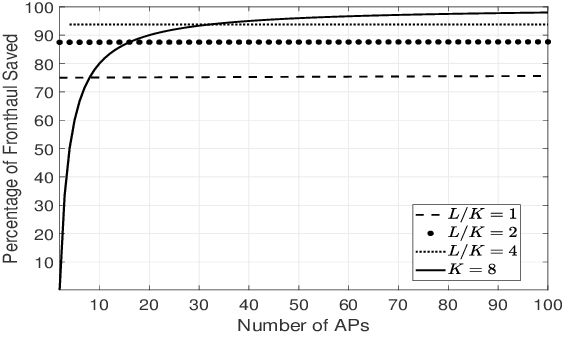Zakir Hussain Shaik
Decentralized Algorithms for Out-of-System Interference Suppression in Distributed MIMO
May 07, 2024

Abstract:Out-of-system (OoS) interference is a potential limitation for distributed networks that operate in unlicensed spectrum or in a spectrum sharing scenario. The OoS interference differs from the in-system interference in that OoS signals and their associated channels (or even their statistics) are completely unknown. In this paper, we propose a novel distributed algorithm that can mitigate OoS interference in the uplink and suppress the signal transmission in the OoS direction in the downlink. To estimate the OoS interference, each access point (AP), upon receiving an estimate of OoS interference from a previous AP, computes a better estimate of OoS interference by rotate-and-average using Procrustes method and forwards the estimates to the next AP. This process continues until the central processing unit (CPU) receives the final estimate. Our method has comparable performance to that of a fully centralized interference rejection combining algorithm and has much lower fronthaul load requirements.
Resource Efficient Over-the-Air Fronthaul Signaling for Uplink Cell-Free Massive MIMO Systems
Nov 14, 2023Abstract:We propose a novel resource efficient analog over-the-air (OTA) computation framework to address the demanding requirements of the uplink (UL) fronthaul between the access points (APs) and the central processing unit (CPU) in cell-free massive multiple-input multiple-output (MIMO) systems. We discuss the drawbacks of the wired and wireless fronthaul solutions, and show that our proposed mechanism is efficient and scalable as the number of APs increases. We present the transmit precoding and two-phase power assignment strategies at the APs to coherently combine the signals OTA in a spectrally efficient manner. We derive the statistics of the APs locally available signals which enable us to to obtain the analytical expressions for the Bayesian and classical estimators of the OTA combined signals. We empirically evaluate the normalized mean square error (NMSE), symbol error rate (SER), and the coded bit error rate (BER) of our developed solution and benchmark against the state-of-the-art wired fronthaul based system
Distributed Signal Processing for Out-of-System Interference Suppression in Cell-Free Massive MIMO
Jul 31, 2023Abstract:Cell-free massive multiple-input-multiple-output (CF-mMIMO) is a next-generation wireless access technology that offers superior coverage and spectral efficiency compared to conventional MIMO. With many future applications in unlicensed spectrum bands, networks will likely experience and may even be limited by out-of-system (OoS) interference. The OoS interference differs from the in-system interference from other serving users in that for OoS interference, the associated pilot signals are unknown or non-existent, which makes estimation of the OoS interferer channel difficult. In this paper, we propose a novel sequential algorithm for the suppression of OoS interference for uplink CF-mMIMO with a stripe (daisy-chain) topology. The proposed method has comparable performance to that of a fully centralized interference rejection combining algorithm but has substantially less fronthaul load requirements.
Distributed Computation of A Posteriori Bit Likelihood Ratios in Cell-Free Massive MIMO
Nov 30, 2021

Abstract:This paper presents a novel strategy to decentralize the soft detection procedure in an uplink cell-free massive multiple-input-multiple-output network. We propose efficient approaches to compute the a posteriori probability-per-bit, exactly or approximately when having a sequential fronthaul. More precisely, each access point (AP) in the network computes partial sufficient statistics locally, fuses it with received partial statistics from another AP, and then forwards the result to the next AP. Once the sufficient statistics reach the central processing unit, it performs the soft demodulation by computing the log-likelihood ratio (LLR) per bit, and then a channel decoding algorithm (e.g., a Turbo decoder) is utilized to decode the bits. We derive the distributed computation of LLR analytically.
 Add to Chrome
Add to Chrome Add to Firefox
Add to Firefox Add to Edge
Add to Edge